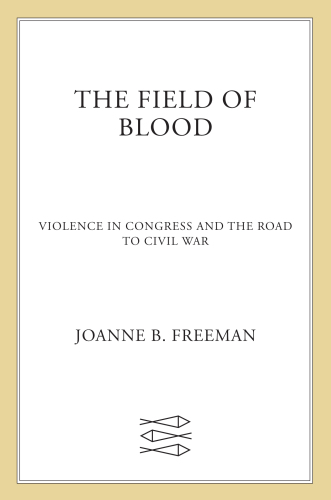
The Field of Blood
Violence in Congress and the Road to Civil War
کتاب های مرتبط
- اطلاعات
- نقد و بررسی
- دیدگاه کاربران
نقد و بررسی

July 1, 2018
A hair-raising history of "extreme congressional discord and national divisiveness." No, not today, but rather before and during the Civil War, when violence among members of Congress was not uncommon.According to Freeman (History and American Studies/Yale Univ.; Affairs of Honor: National Politics in the New Republic, 2001, etc.), between the Jackson and Lincoln administrations, congressional sessions regularly featured "canings, duel negotiations and duels; shoving and fistfights; brandished pistols and bowie knives; wild melees in the House; and street fights with fists and the occasional brick. Not included in that number is bullying that never went beyond words." History buffs will recall the brutal 1856 caning of Massachusetts Sen. Charles Sumner by South Carolina's Preston Brooks, but Freeman emphasizes that this was just the tip of the iceberg. She emphasizes that, aided by the three-fifths rule, the South dominated the Congress before 1860, and its quasi-aristocratic macho culture accepted dueling, gunplay, and fisticuffs long after it became passé in the North. This had only a modest effect until the 1830s, when opposition to slavery became a national issue. Abolitionist arguments made the South crazy. By 1840, any expression of anti-slavery opinions was illegal in those states, so most Southerners never encountered them. Sent to Congress, they were outraged. Since Northerners disliked duels and often compromised to preserve party unity, Southerners considered them sissies. This encouraged "bullying"--Freeman's favorite term--in which Southerners threatened violence, confident that opponents, knowing the threat was genuine, would yield. As the author demonstrates, this sometimes failed because pugnacious Northerners existed, and personal insults led to lost tempers and brawls. Quiet descended with secession, when Southern representatives moved to the Confederate Congress in Richmond, where, ironically, violence flourished.Freeman leans heavily on journalists and diarists to deliver a vivid portrait of a dysfunctional government that--minus the literal bloodshed--has been compared to today's but was probably worse.
COPYRIGHT(2018) Kirkus Reviews, ALL RIGHTS RESERVED.

August 6, 2018
History professor and podcaster Freeman (Affairs of Honor) excavates a little-discussed aspect of American history in this scholarly but brisk and accessible account. She draws extensively on the journals of Benjamin Brown French, who, as a clerk in the House of Representatives, had a front-row seat to the posturing, name-calling, dueling, and brawling that regularly erupted in Congress in the decades leading up to the Civil War. While members historically sparred along party and regional lines, the issue of slavery combined with bullying insults
to various
members’ masculinity led to
frequent intimidation and violence. The journals also detail French’s transformation from an early Jacksonian Democrat to a weary Republican ready for the South’s departure, paralleling the evolution of other Northerners’ thinking. French’s long-standing friendship with the unmemorable Franklin Pierce provides fresh insight into the political culture of the time, and the descriptions of the tragicomic Cilley-Graves duel and the horrific caning of Charles Sumner are detailed and thoughtful. Freeman writes from the northern point of view, and the Southerners read as a monolithic group of bullies. Freeman grants followers of modern politics a look back at another fascinating, impassioned period of change in which Congress became full of “distrust, defensiveness, and degradation,” mimicking the constituents at home. Agent: Wendy Strothman, the Strothman Agency.

Starred review from August 1, 2018
Benjamin French, a New Hampshire native, spent more than three decades living and working in Washington, DC, first as a clerk and then clerk of the House of Representatives. Little escaped his attention, and several details were recorded in his voluminous diary. This unique source, used to great effect by historian Freeman (history, Yale Univ.; Affairs of Honor), helps to uncover the rowdy and violent behavior in the House that mirrored the wider society in the decades preceding the American Civil War. Behind the fistfights, guns, knives, and duels lied a deeper threat the author describes as a process of disunion. Southerners, with their deeply ingrained code of honor, who viewed criticism of slavery as a personal affront, bullied House members who crossed them, using duel challenges or procedural rules to silence debate. Freeman traces how regional and party differences solidified into two intractable and hostile camps. Congressional violence was but a telling symptom of the deepening sectional and political divide preceding the Civil War. VERDICT A thought-provoking and insightful read for anybody interested in American politics in the lead up to the Civil War.--Chad E. Statler, Westlake Porter P.L., Westlake, OH
Copyright 2018 Library Journal, LLC Used with permission.

August 1, 2018
In the era immediately preceding the Civil War, Congress was repeatedly shattered by violent threats, canings, fisticuffs, and drawn knives and pistols; a representative was even killed in a duel. The result of tensions pitching upward owing to the war? No, says, Yale historian Freeman (The Essential Hamilton). These violent events helped cause the war.
Copyright 2018 Library Journal, LLC Used with permission.

























دیدگاه کاربران